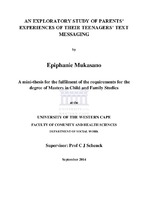| dc.description.abstract | Today the mobile phone plays a vital role in social life across the globe. For many teenagers and young adults in particular, this device forms an integral part of their daily communication, with text messaging being one of their preferred modes of social interaction. Researchers across the globe have studied various facets of this phenomenon but he main focus has been on this mode of communication in peer relationships. From a family systems perspective, the current qualitative study intended to explore how parents experience their teenagers’ text messaging in terms of communication and relationships with their teenagers, and how parents regulate this pervasive practice. To this end, data were collected by means of
one-on-one interviews among eleven parents (eight mothers and three fathers) in Cape Town, South Africa, using a semi-structured interview schedule. With the participants’ permission, the sessions were tape-recorded; data were transcribed, content analysed, and patterns and themes identified according to Creswell’s (2009) steps. Participants expressed a range of experiences, from positive to negative, not only of text messaging, but of their teenagers’ use of mobile phones in general. Among the positives, it was the sense of security the devices gave parents, and the possibility of communicating easily, quickly and at affordable cost and at the same time monitoring their children at a distance. The negatives were mainly related to the misuse/and overuse of the mobile phones. The study suggests that parents were aware of some of the dangers associated with mobile phones, such as bullying, sexting, texting while driving, overuse at the expense of family, studying and sleeping times, and home chores. It also reveals that girls were more at risk, especially when it came to mobile bullying and sexting. Some parents came up with suggestions on dealing with mobile phones and text messaging-related problems. Furthermore, the study is indicative of a predominantly authoritative parenting style whereby parents successfully limited these dangers by regulating the use of their teenagers’ mobile phones. However, for some, finding the balance, especially between parental control and teenagers’ privacy, proved to be a challenge. Moreover, while expressing the need for mobile internet, especially for teenagers’ school work, the majority of participants showed concern about having it under control. The study concludes that text messaging can be used to enhance communication and relationships between parents and their teenagers. It recommends educating the latter about the dangers of mobile phones and the former to monitor their use, while at the same time negotiating teenagers’ freedom. | en_US |

